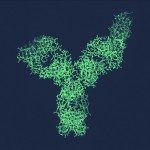Link to Pubmed [PMID] – 23531222
Curr. Med. Chem. 2013;20(18):2351-62
Although several constitutive proteasome inhibitors have been reported these recent years, potent organic, noncovalent and readily available inhibitors are still poorly documented. Here we used a structure- and ligand-based in silico approach to identify commercially available 1,2,4-oxadiazole derivatives as non-covalent human 20S proteasome inhibitors. Their optimization led to the newly synthesized compound 4h that is a mixed proteasomal inhibitor of the chymotrypsin- like activity (K(i) of 26,1 nM and K'(i) of 7.5 nM) which is in addition selective versus the challenging cathepsin B and calpain proteases. Molecular modelling studies corroborated the mechanism of inhibition and suggest an unusual binding of the inhibitor within the S5 binding pocket (β6 subunit). The cellular effects of our compounds validate their utility as potential pharmacological agents for anti-cancer pre-clinical studies.

